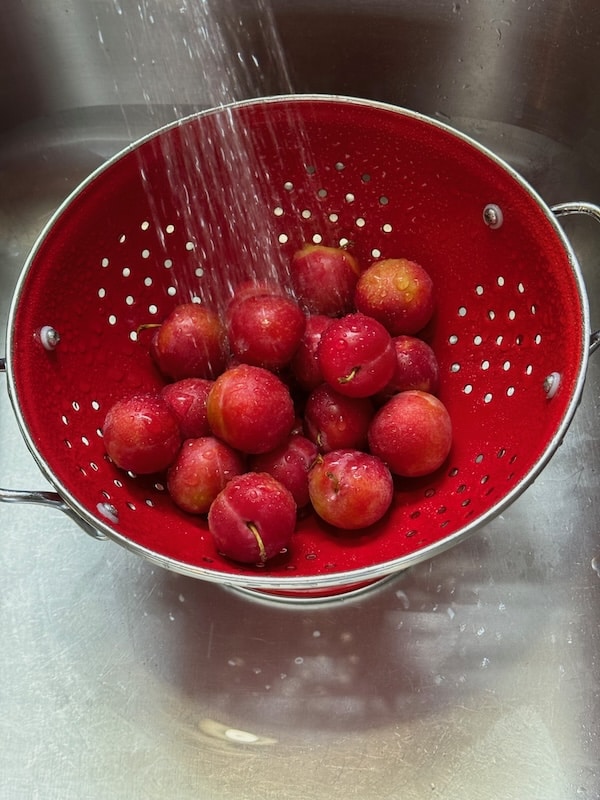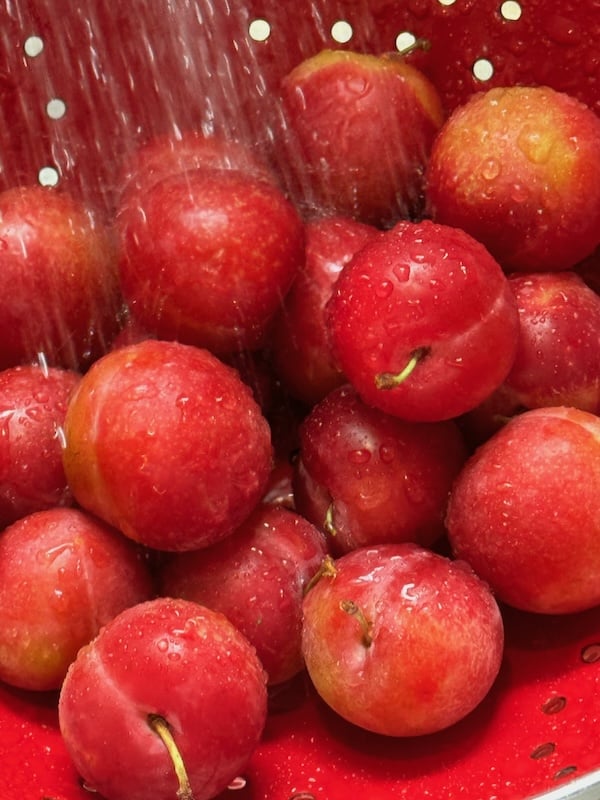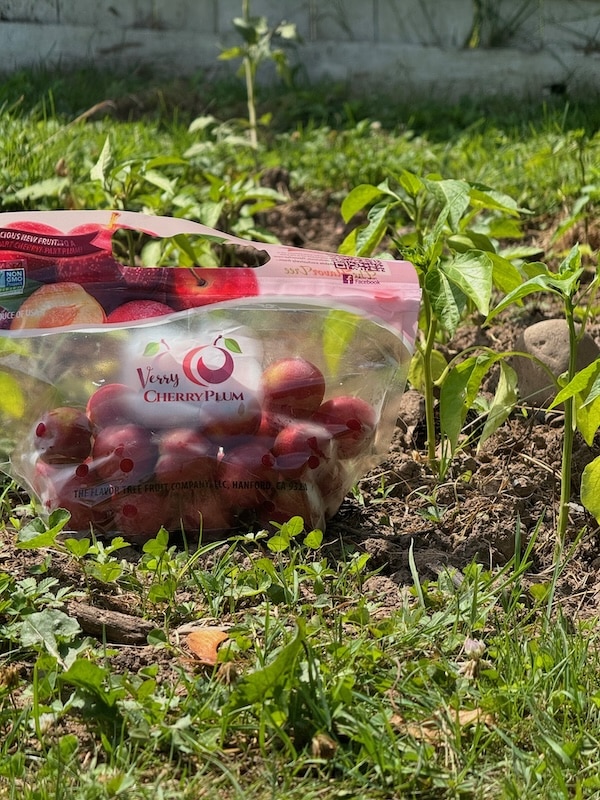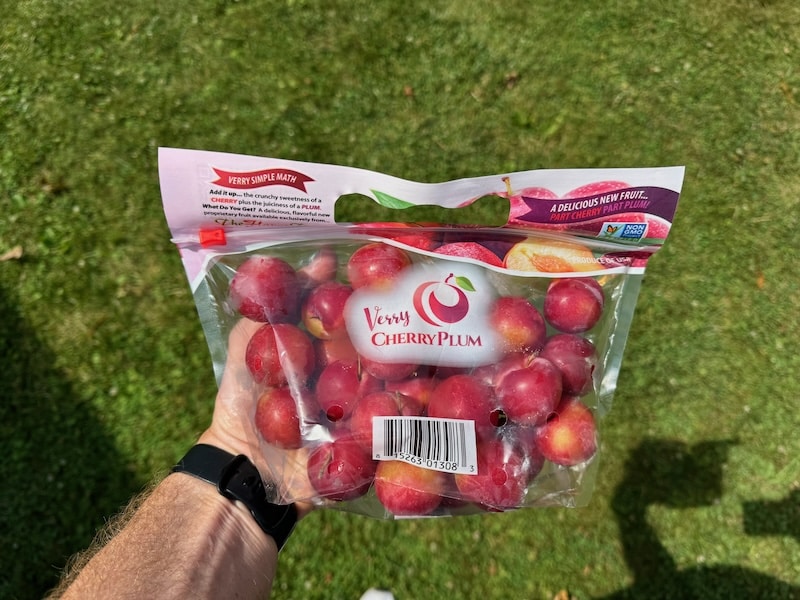What Are Cherry Plums & Are They Healthy? I Just Found Out!
On my latest trip to Walmart, I found something I’d never seen or heard of before: cherry plums!
Also known as Myrobalan plums or purple leaf plums, cherry plums (Prunus cerasifera) are delightful fruits that combine some of the best qualities of cherries and plums.
Having spent much of the last six years living in Poland, which is home to some of the widest varieties and best quality plums in the world, I was thrilled to find another unique type of plum I had never seen before.
As I learned after buying and trying my first bag of cherry plums, these small, colorful fruits are cherished for their sweet-tart flavor and impressive nutritional profile.
Widely cultivated as ornamental plants, cherry plums have also escaped into the wild, where they flourish near towns, along roadsides, and in natural habitats.
While often enjoyed fresh, they are also used to make jams, jellies, and other preserves.
With their vibrant hues and versatile culinary uses, cherry plums hold a special place in various cultures and cuisines around the world, and now my house!
What Are Cherry Plums?

Cherry plums (Prunus cerasifera) are small fruits, typically measuring 2 to 3 centimeters in diameter.
Although new to the U.S., they have a long history in Europe and Asia, where they are cherished for both culinary and ornamental purposes.
They have an oval to-round shape and feature thin, smooth, and glossy skin in various colors, including dark red, bright red, and golden hues.
When harvested young, cherry plums have high acidity, contributing to a tart but refreshing sour flavor.
As they mature on the tree, their flesh develops natural sugars and astringency, creating a balanced, sweet-tart, tangy flavor with hints of fruity spices.
The cherry plums I ate were a bit sour but sweet and incredibly refreshing. As someone who has eaten a ton of plums in the last few years, I can say these Verry Cherry Plums are delicious and comparable to some of the best plums I’ve had!
If you are looking for a new fruit to add to your diet, I highly suggest you check these out.
Availability
Cherry plums are typically available in the summer as the fruit ripens from late May to the end of July, providing a seasonal treat during the warm months.
Eating seasonal fruits and vegetables, such as fresh cherry plums, is one of the best summer health tips I regularly recommend.
Native to Western Asia and Southeastern Europe, cherry plums have been cultivated for centuries.
They spread along trade routes to Europe, the British Isles, and Eastern Asia, becoming a beloved fruit in these regions.
In many cultures, cherry plums are enjoyed fresh or in traditional dishes. In the Middle East, unripe cherry plums are a delicacy, while in Georgia, they are a key ingredient in the traditional lamb stew, chakapuli, and the tangy sauce tkemali.
Cherry plums have been increasing in commercial production in the U.S. since their introduction.
Introduced to North America in the early 21st century, cherry plums, such as the “Verry Cherry Plum” developed by Zaiger’s Genetics in California, are hybrids combining the best qualities of plums and cherries.
I bought Verry Cherry Plum’s from Walmart, and it was the first store near me (I live in New York) that stocked this fruit.
Nutritional Profile

Cherry plums are not only delicious but also packed with nutrients, making them a healthy addition to your diet.
Their low-calorie content and rich nutrient profile offer various health benefits.
Caloric Content and Macronutrients
Cherry plums are low in calories, with approximately 80 kcal per 100 grams, making them an excellent choice for weight management.
As a fruit, cherry plums are low in fat but contain natural sugars.
However, they also provide a good amount of dietary fiber (about 1.5 grams of fiber per 100 grams), which aids in digestion and helps maintain a healthy weight.
Vitamins and Minerals
Cherry plums are a good source of several vitamins and minerals, including:
- Potassium: Essential for balancing fluid levels in the body and supporting cardiovascular health.
- Vitamin A: Important for maintaining healthy vision, immune function, and skin health.
- Vitamin C: Strengthens the immune system, reduces inflammation, and acts as an antioxidant.
- Iron: Crucial for developing hemoglobin, which transports oxygen through the bloodstream.
- B Complex Vitamins: Affect metabolism and nervous system health.
- Calcium and Phosphorus: Important for bone health and various metabolic functions.
Antioxidants
Cherry plums are rich in antioxidants, particularly in their skin.
Cherry plums contain anthocyanins, polyphenols, and carotenes, which help combat oxidative stress and reduce the risk of chronic diseases.
The antioxidants present in cherry plums contribute to various health benefits, including improved eyesight, memory, and learning, as well as anti-diabetic, anti-inflammatory, and anti-anxiety effects.
Health Benefits
- Digestive Health: The high fiber content, particularly pectin, aids in relieving constipation and improving hemorrhoids by softening stools and promoting regular bowel movements. Pectin also has prebiotic properties, supporting the health of the colon and the growth of beneficial gut bacteria.
- Weight Management: Low in calories and high in fiber, cherry plums help control appetite and support natural weight loss by binding to dietary fats and preventing their absorption.
- Cardiovascular Health: The fiber in cherry plums helps lower LDL (bad) cholesterol levels, while the antioxidants combat lipid peroxidation, reducing the risk of cardiovascular diseases.
- Immune System Support: Rich in vitamin C, cherry plums boost the immune system and reduce inflammation, helping the body fight off infections and illnesses.
- Overall Wellness: The combination of vitamins, minerals, and antioxidants in cherry plums supports overall health, contributing to improved skin health, better vision, and enhanced cognitive function. They also offer tonic properties, stimulating appetite and boosting energy levels.
Incorporating cherry plums into your diet can provide numerous health benefits while adding a delicious and unique flavor to your meals.
Storage Tips
To enjoy cherry plums at their best, it’s important to store them properly.
Whole, unwashed cherry plums should be left at room temperature until they soften.
Once ripe, they can be stored in the refrigerator’s crisper drawer for an additional 3 to 5 days, depending on the variety and maturity.
Proper storage ensures that the fruits retain their flavor and texture for as long as possible.
Cherry plums are a versatile and delicious fruit that can be used in a wide range of culinary applications.
Whether eaten fresh, preserved, baked, or cooked, they add a unique and delightful flavor to any dish.
Final Thoughts: Are Cherry Plums Good for You?

As you can see, cherry plums are good for you.
Cherry plums are not only a delightful addition to your diet but also a nutritious one.
Their rich content of vitamins, minerals, and antioxidants offers a range of health benefits, from supporting digestive health and weight management to enhancing cardiovascular and immune system functions.
Cherry plums’ high fiber content aids digestion and promotes a healthy gut, while their low calories make them an excellent choice for those looking to manage their weight.
The abundance of antioxidants, particularly in the skin, helps combat oxidative stress and reduces the risk of chronic diseases.
Additionally, the vitamins and minerals found in cherry plums contribute to overall wellness, supporting everything from skin health to cognitive function.
Incorporating cherry plums into your diet is easy and versatile.
Whether enjoyed fresh, made into jams, baked into desserts, or used in savory dishes, cherry plums add a unique flavor and nutritional boost to any meal.
This website does not provide medical advice. This website site does contain affiliate links, and purchases may earn a commission.
Read my Medical Disclaimer, Review Disclaimer, and Publishing Policies for more details. Use of this site indicates acceptance of these terms.



